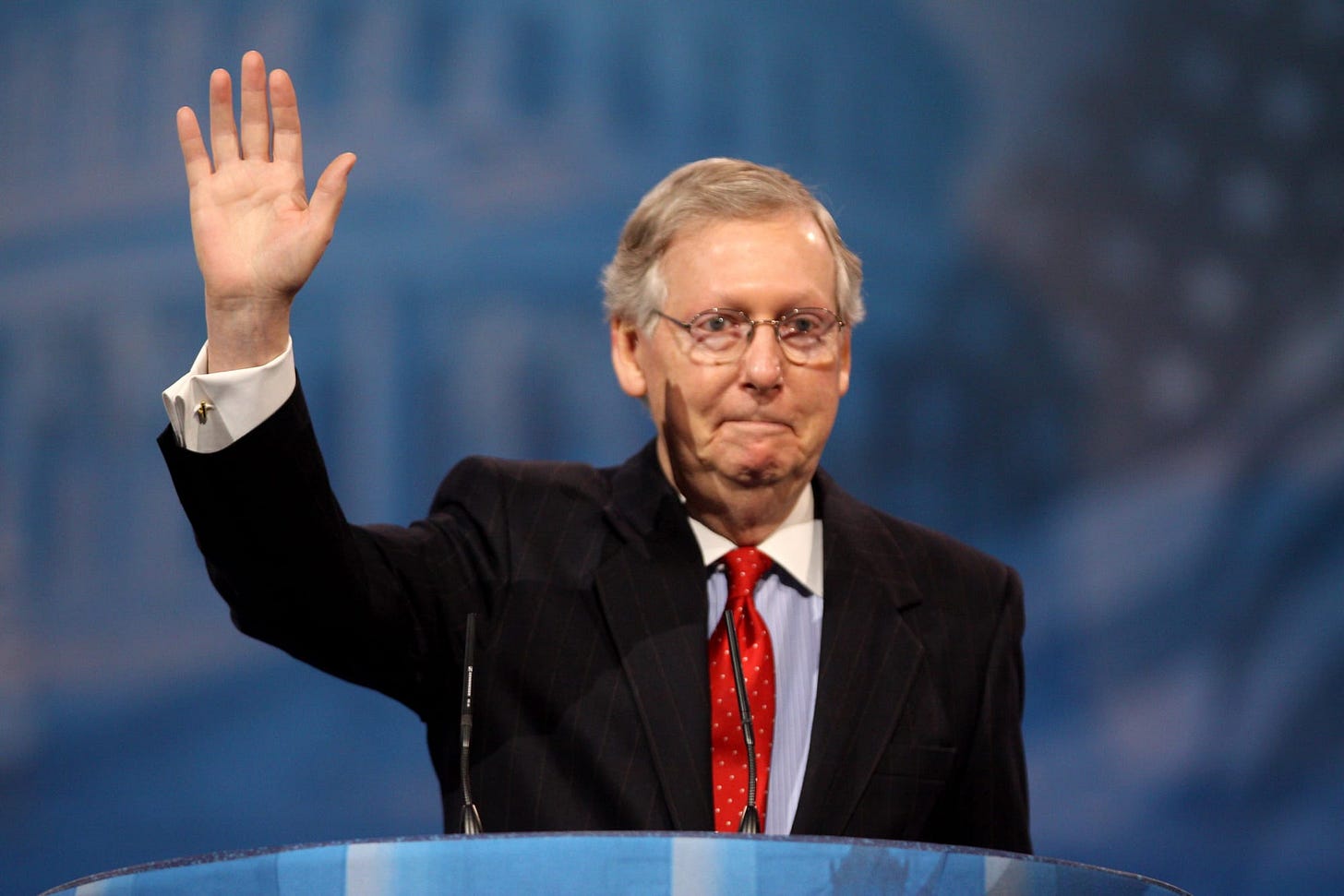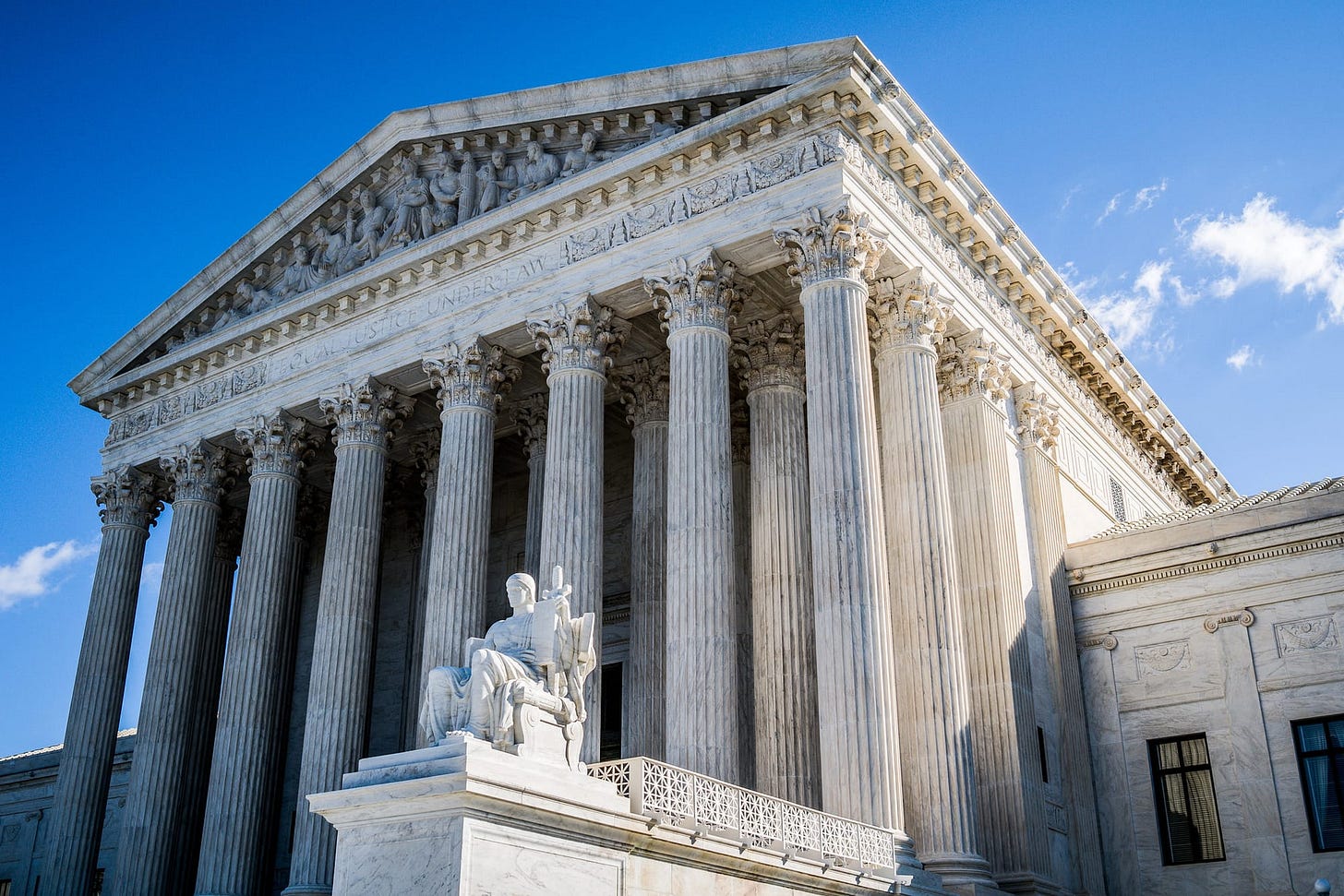The end of the McConnell era
With McConnell out of the way, Donald Trump will have cemented control over all of the GOP’s main institutions in Washington.
Good morning! It’s Thursday, February 29, 2024. Election Day is 250 days away. If this newsletter was forwarded to you, subscribe here. If you want to contribute to support my work, donate here.
Mitch McConnell’s announcement on Wednesday that he will step down as the Senate Republican leader in November — after 17 years in the role — hardly came as an earth-shattering surprise.
After all, McConnell’s challenges — both personal and political — have been on searingly public display for months now. The Kentucky senator, who turned 82 last week, has fallen multiple times in the last year, including an incident in March that left him with a concussion and took him away from his beloved Senate for six weeks.
In July and August, he suffered two mysterious freeze-ups while answering reporters’ questions, a pair of televised health episodes that were never explained by his advisers.
His grip on the Senate Republican Conference, once so strong, has also been loosening all year, as his own members have abandoned his top priority (Ukraine aid) and paved the way for the re-emergence of his ally turned nemesis, Donald Trump.
“Father Time remains undefeated,” McConnell said on Wednesday.
But, still, the long-awaited announcement represented a major shift in Washington, where McConnell has been a constant since his arrival in 1985.
98 of his 99 fellow sitting senators were not in office when McConnell joined the Senate, at the height of the Reagan Revolution. His tenure as the Senate’s top Republican, which began in 2007, is the longest of any floor leader in Senate history, surpassing other legends of the chamber like Lyndon Johnson, Robert Byrd, and Everett Dirksen.
While the rest of Washington’s upper echelon has kept churning — through four presidents, five House speakers, and three shifts in the Senate majority — there McConnell has been as GOP leader, rarely saying much but often outmaneuvering his opponents.
McConnell’s most important legacy will likely be his makeover of the federal judiciary, which culminated in three Supreme Court confirmations during the Trump presidency — creating the court’s 6-3 conservative majority.
The confirmation of Trump’s first pick, Neil Gorsuch, was only possible because McConnell refused to cave in 2016, insisting that the late Antonin Scalia’s seat be filled by the next president. The third confirmation, of Amy Coney Barrett, was then sped along by McConnell, who reversed his earlier red-line by rushing her through in the heat of an election year.
Both gambles could have backfired, but they resulted in a successful reshaping of the court, as seen in recent decisions on regulations, affirmative action, and abortion. McConnell, as the title of his memoir suggested, was playing “The Long Game” once again.
It is no coincidence that McConnell’s exit coincides with Trump’s return. After working closely with the then-president on judicial confirmations, McConnell broke sharply with Trump in the chaotic wake of the 2020 election. The Kentuckian enraged Trump by acknowledging Joe Biden’s victory in a December 2020 address on the Senate floor; they have not spoken since that day.
After the January 6th riot, McConnell toyed with convicting Trump in his second impeachment trial, although he ultimately voted for acquittal — a decision he may now be living to regret, as the former president cements his takeover of McConnell’s GOP.
In the Biden era, working with a president he knew well from their time as colleagues in the Senate, McConnell has frequently broken with Trump and other leading figures in the party, embracing bipartisan deals on infrastructure, manufacturing, gun control, electoral reform, and other issues.
Most recently, he has joined with Biden in championing Ukraine aid, first alongside a border security deal (which his Republican members rejected) and then, last month, in a standalone foreign aid package (which a majority of Senate Republicans opposed).
These unorthodox stances in the modern GOP have earned him Trump’s enmity — the ex-president refers to McConnell as “Old Crow” — and emboldened more Trump-friendly Republican senators to buck his leadership. In early 2023, he faced his first-ever challenger as Senate GOP leader, Florida Sen. Rick Scott, a smaller version of the turbulence on the GOP side in the House.
In a sign of McConnell’s draining power, many of these MAGA-wing senators were not shy about celebrating his departure. “One of his great legacies will be the avalanche of corporate money that has disfigured our politics,” Sen. Josh Hawley (R-MO) told reporters. “The Senate is bought and paid for by Big Tech. Nobody has done more, by the way, to make that possible than Mitch McConnell.” (The House Freedom Caucus was even more explicit, offering their thoughts on Twitter to “our Democrat colleagues in the Senate on the retirement of their Co-Majority Leader Mitch McConnell (D-Ukraine).”)
With McConnell’s exit, Republican Party will have shaken off any vestiges of the Reagan era, completing Trump’s transformation of the party — something McConnell seemed to acknowledge Wednesday.
“Believe me, I know the politics within my party at this particular moment in time,” McConnell said on the Senate floor. “I have many faults: misunderstanding politics is not one of them.”
All three of McConnell’s most likely successors have endorsed Trump’s presidential comeback bid, unlike McConnell (although he is reportedly in talks to do so).
The rising trio — known as the “Three Johns” — is made up of Senate Republican Whip John Thune (R-SD), former Senate Republican Whip John Cornyn (R-TX), and Senate Republican Conference Chair John Barrasso (R-WY).
Of the three, Thune is the closest on the ideological spectrum to McConnell (he has also had his clashes with Trump, who has labeled him a “RINO”). Barrasso, on the other hand, has hugged Trump closest.
Republican senators even closer to Trump, like Scott, are also expected to mount bids for McConnell’s post. Unlike the orderly Democratic succession after Nancy Pelosi stepped down from House leadership last year, the Republican campaign to replace McConnell will likely be chaotic. One GOP senator told Politico that he expects 8 to 10 Republicans to enter the race for the position.
After the departure of McConnell, his last main GOP antagonist, Trump will likely have allies installed atop all the main Republican institutions in Washington, from the RNC (where his daughter-in-law is poised to become co-chair) to the House Republican Conference (where he helped orchestrate Mike Johnson’s rise to speaker) to the Senate GOP (where his endorsement in the post-McConnell race could be decisive).
If Trump is re-elected, just as his second administration is likely to contain fewer main-line Republicans than his first, McConnell’s exit will take away another key guardrail standing in the way of Trump’s more extreme impulses. During the first Trump term, McConnell resisted Trump’s pressure for him to abolish the Senate filibuster; there is no guarantee that McConnell’s successor will act similarly. Trump would thus have free rein to implement not only a more assertive executive policies, but a more expansive legislative agenda as well.
For at least the first two years of the next presidential term, McConnell will remain in Washington, though as a much weaker rank-and-file member. Mimicking Pelosi, McConnell said Wednesday that he plans to serve out his current Senate term, which will end in January 2027. That decision is an unusual one: in the last 70 years, only two other former Senate floor leaders have remained in the chamber after leaving leadership.
Clearly, McConnell is ready to hand the reins to a new generation — but not quite to step away completely.
“I still have enough gas in the tank to thoroughly disappoint my critics,” the Kentuckian said, “and I intend to do so with all the enthusiasm which they have become accustomed.”
More news to know.
Speaking of McConnell’s transformation of the judiciary... From the New York Times: “The Supreme Court that former President Donald J. Trump helped to shape tossed him a legal lifeline on Wednesday night, making a choice that substantially aided his efforts to delay his federal trial on charges of plotting to overturn the 2020 election.”
“By deciding to take up Mr. Trump’s claim that presidents enjoy almost total immunity from prosecution for any official action while in office — a legal theory rejected by two lower courts and one that few experts think has any basis in the Constitution — the justices bought the former president at least several months before a trial on the election interference charges can start.”
More headlines to know:
Illinois judge rules Trump ineligible for Republican primary ballot over Jan. 6 riot — NBC
Congressional leaders strike deal on government funding as shutdown looms — CBS
Biden just got a physical. But a cognitive test was not part of the assessment — NPR
GOP Sen. Cindy Hyde-Smith blocks legislation protecting IVF access — CNN
Defiant Hunter Biden testifies behind closed doors in GOP impeachment inquiry — ABC
Donald Trump must post a bond for full $454 million fraud judgment during appeal: judge — USA Today
The day ahead.
At the border: Both President Biden and former President Trump will visit the U.S.-Mexico border today, as immigration politics take on a lead role in their coming rematch. From the AP: “Biden will travel to Brownsville, Texas, in the Rio Grande Valley, an area that often sees large numbers of border crossings, White House press secretary Karine Jean-Pierre said Monday. He will meet border agents and discuss the need for bipartisan legislation. It would be his second visit to the border as president. He traveled to El Paso in January last year.”
“Trump, for his part, will head to Eagle Pass, Texas, about 325 miles or 520 kilometers away from Brownsville, another hotspot in the state-federal clash over border security, according to three people who spoke to The Associated Press on condition of anonymity to discuss the plans.”
In the Senate: The upper chamber will vote on confirmation of Marjorie Rollinson to be Chief Counsel of the IRS and a Republican-authored resolution overturning the National Labor Relations Board’s joint employer rule.
In the House: The lower chamber is set to vote on the bipartisan continuing resolution extending some government funding through March 8 and the rest through March 22.
Thanks for reading.
I get up each morning to write Wake Up To Politics because I’m committed to offering an independent and reliable news source that helps you navigate our political system and understand what’s going on in government.
The newsletter is completely free and ad-free — but if you appreciate the work that goes into it, here’s how you can help:
Donate to support my work or set up a recurring donation (akin to a regular subscription to another news outlet).
Buy some WUTP merchandise to show off your support (and score a cool mug or hoodie in the process!)
Tell your family, friends, and colleagues to sign up at wakeuptopolitics.com. Every forward helps!
If you have any questions or feedback, feel free to email me: my inbox is always open.
Thanks so much for waking up to politics! Have a great day.
— Gabe




